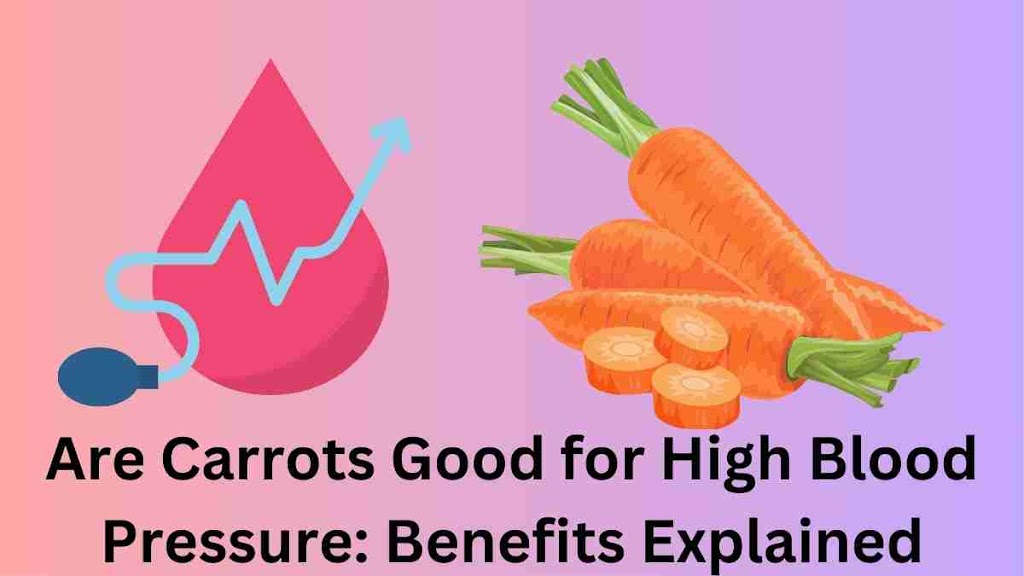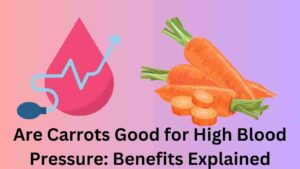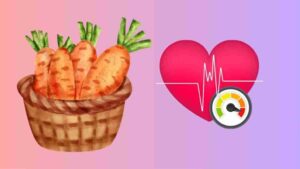High blood pressure, also known as hypertension, is a common health condition that affects millions of individuals. Managing blood pressure levels is crucial for maintaining overall health and reducing the risk of heart disease and stroke. While medication and lifestyle changes are often recommended, incorporating certain foods into your diet can also be beneficial.
One such food is carrots. Carrots are not only delicious but also packed with nutrients that may have positive effects on high blood pressure. In this article, we will explore the potential benefits of carrots for individuals with high blood pressure and how they can be incorporated into a hypertension-friendly diet.
Key Takeaways:
- Carrots are a nutrient-dense vegetable that can contribute to a well-balanced diet.
- The nutritional content of carrots, including potassium, fiber, and antioxidants, may have positive effects on blood pressure management.
- Carrots can potentially help regulate blood pressure levels by promoting heart health and reducing inflammation.
- Incorporating carrots into meals, snacks, and recipes is an easy and flavorful way to support blood pressure management.
- Including carrots as part of a hypertension-friendly diet may offer additional advantages in managing high blood pressure.
Nutritional Content of Carrots
When it comes to maintaining a healthy diet, understanding the nutritional content of the foods we consume is crucial. Carrots, a versatile and widely available vegetable, offer an array of beneficial vitamins and minerals that make them a valuable addition to any diet.
Vitamins
Carrots are rich in essential vitamins, including vitamin A, vitamin C, and vitamin K. Vitamin A plays a vital role in maintaining healthy vision and supporting the immune system. Meanwhile, vitamin C acts as an antioxidant, protecting the body against cell damage and boosting collagen production. Vitamin K is essential for blood clotting and bone health.
Minerals
Carrots also provide a range of essential minerals, such as potassium, manganese, and calcium. Potassium is particularly important for individuals with high blood pressure, as it helps regulate fluid balance and maintain healthy blood pressure levels. Manganese aids in the metabolism of carbohydrates, proteins, and fats, while calcium contributes to strong bones and teeth.
Fiber
In addition to vitamins and minerals, carrots are an excellent source of dietary fiber. Fiber is known for its ability to promote healthy digestion and regulate blood sugar levels. It also aids in weight management, as it keeps you feeling fuller for longer.
Incorporating Carrots into Your Diet
There are numerous ways to include carrots in your daily meals and snacks. Whether you prefer raw carrots as a crunchy afternoon snack or enjoy incorporating them into favorite recipes, the options are endless.
Try grating carrots into salads, adding them to stir-fries, or roasting them for a tasty side dish. You can also blend carrots into soups or puree them as a base for sauces and dressings.
Remember, achieving a well-balanced diet is essential for managing high blood pressure. By incorporating carrots into your meals and snacks, you can boost your nutritional intake and support your overall health.
| Nutrient | Amount per 100g of Carrots |
|---|---|
| Calories | 41 |
| Protein | 0.93g |
| Fat | 0.24g |
| Carbohydrates | 9.58g |
| Fiber | 2.8g |
| Potassium | 320mg |
| Vitamin A | 835µg |
| Vitamin C | 5.9mg |
| Vitamin K | 13.2µg |
| Calcium | 33mg |
| Manganese | 0.143mg |
Impact of Carrots on High Blood Pressure
Carrots have been found to have a positive impact on individuals with high blood pressure. The nutrients present in carrots, such as potassium and fiber, play a crucial role in promoting heart health and regulating blood pressure levels.
Potassium is an essential mineral that helps maintain proper fluid balance in the body and supports healthy blood pressure. Carrots are a rich source of potassium, with one medium-sized carrot containing approximately 230 milligrams of this mineral. Including potassium-rich foods like carrots in the diet can help counteract the effects of sodium and promote overall cardiovascular health.
Fiber, another important component of carrots, has been linked to lower blood pressure levels. A study published in the American Journal of Hypertension found that increased dietary fiber intake was associated with reduced systolic and diastolic blood pressure. Carrots are an excellent source of dietary fiber, as they contain both soluble and insoluble fiber, which can help improve cholesterol levels and maintain healthy blood pressure.
“The nutrients in carrots, such as potassium and fiber, can contribute to better heart health and support blood pressure regulation.”
Moreover, the antioxidants present in carrots, including beta-carotene and anthocyanins, have been shown to have protective effects on cardiovascular health. These antioxidants help reduce inflammation and oxidative stress, which are two key contributors to the development of high blood pressure.
It’s important to note that while carrots can be beneficial for individuals with high blood pressure, they should not be relied upon as the sole treatment. Maintaining an overall balanced diet, exercising regularly, and following any medical advice from healthcare professionals are crucial for managing high blood pressure effectively.
Incorporating carrots into a well-rounded, hypertension-friendly diet can have a positive impact on blood pressure levels, thanks to their rich nutritional content. Whether enjoyed raw, steamed, or incorporated into various dishes, carrots offer a tasty and nutritious addition to any heart-healthy eating plan.
Incorporating Carrots into a Hypertension-Friendly Diet
When it comes to managing high blood pressure, incorporating carrots into your diet can be a smart and delicious choice. Carrots are not only packed with essential nutrients, but they also offer numerous health benefits that support heart health. Here are some practical tips on how to add carrots to your hypertension-friendly diet:
1. Enjoy Carrots as a Snack
Swap out unhealthy snacks for carrot sticks or baby carrots. They provide a satisfying crunch and are packed with fiber, helping you feel fuller for longer. Carrots are also low in calories, making them a guilt-free option for snacking.
2. Add Carrots to Salads
Boost the nutritional value of your salads by incorporating carrots. Grate or thinly slice carrots and toss them into your favorite salads. Not only will they add color and texture, but they will also provide an extra dose of vitamins and minerals.
3. Blend Carrots into Smoothies
For a nutritious and refreshing beverage, blend carrots into your favorite smoothie recipe. Carrots add natural sweetness and a vibrant orange color to smoothies. They also contribute vitamins and minerals that promote heart health.
4. Roast Carrots for a Flavorful Side Dish
Add some roasted carrot goodness to your meals by tossing carrot sticks with olive oil, salt, and your favorite spices. Roasted carrots make a flavorful and nutritious side dish that complements a hypertension-friendly diet.
5. Incorporate Carrots into Stir-Fries
For a quick and easy meal, stir-fry carrots along with other vegetables and lean protein sources. Carrots add a touch of sweetness and provide a satisfying crunch to stir-fries. This versatile vegetable pairs well with a variety of flavors and ingredients.
By incorporating carrots into your hypertension-friendly diet, you can take advantage of their nutritional value and potential health benefits. Remember to consult with a healthcare professional or a registered dietitian to determine the best approach for your individual dietary needs and health goals.
Conclusion
In conclusion, this article has emphasized the potential benefits of including carrots as part of a well-balanced, hypertension-friendly diet for individuals with high blood pressure. By understanding the nutritional content of carrots and their impact on blood pressure, individuals can make informed dietary choices to support their heart health.
Carrots are packed with essential nutrients such as potassium and fiber, both of which play a crucial role in managing high blood pressure. Potassium helps to regulate fluid balance and counteracts the effects of sodium, which can elevate blood pressure levels.
Fiber, on the other hand, aids in maintaining a healthy weight and promotes digestion, which are important factors in hypertension management. Including carrots in your meals, whether raw, cooked, or blended into juices, can help you meet your daily nutritional requirements while enjoying their natural sweetness and crunch.
FAQ
Are carrots beneficial for individuals with high blood pressure?
Yes, carrots can be beneficial for individuals with high blood pressure. They are rich in essential nutrients such as potassium and fiber, which can help regulate blood pressure levels.
What is the nutritional content of carrots?
Carrots are packed with nutrients. They are a great source of vitamin A, potassium, and fiber. These nutrients are important for maintaining heart health and managing high blood pressure.
How do carrots impact high blood pressure?
The nutrients found in carrots, such as potassium and fiber, can have a positive impact on high blood pressure. Potassium helps to relax blood vessels, while fiber aids in maintaining healthy cholesterol levels, both of which contribute to blood pressure management.
How can I incorporate carrots into a hypertension-friendly diet?
There are various ways to incorporate carrots into a hypertension-friendly diet. You can add them to salads, steam them as a side dish, or include them in soups and stir-fries. Carrots can also be used as a crunchy snack or added to smoothies for an extra nutrient boost.
What are the potential benefits of incorporating carrots into a hypertension-friendly diet?
By incorporating carrots into a hypertension-friendly diet, you can benefit from their nutrient-rich profile. Carrots can contribute to heart health, lower blood pressure levels, and support overall well-being. Including them as part of a well-balanced diet can have additional advantages in managing high blood pressure.



